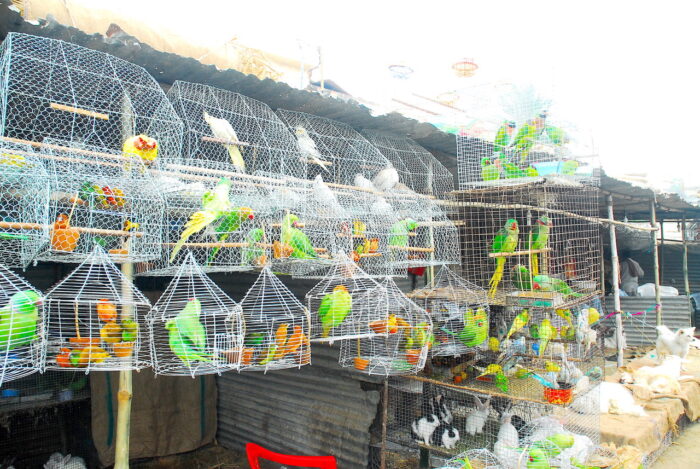
In continuation of the exclusive three-part series, the writer here presents the second part of COVID-19 and wildlife conservation challenges.
The Arguments on Wet Markets- For and Against:
As was to be expected, the COVID-19 situation has led to growing demands for a ban on wildlife trade and the close of “Wet Markets” in China and elsewhere.
On 8th April 2020, 22 US Senators and 43 members of the US House of Representatives , led by Senator Cory A. Booker and Senator Lindsey O. Graham, cutting across political divides, wrote to the Directors-General of the World Health Organization (WHO) , World Organisation for Animal Health (OIE) and the Food and Agriculture Organization of the United Nations (FAO) urging their organizations to take aggressive action toward a global shut down of live wildlife markets and a ban on the international trade of live wildlife that is not intended for conservation purposes.
In the meantime, the Secretariat of the Convention On International Trade In Endangered Species of Wild Fauna And Flora (CITES) has issued a Notification to Parties No. 2020/018 concerning China’s urgent measures regarding wildlife trade regulation on 5 March 2020 as follows :
1. This Notification is being published at the request of China.
2. On 24 February 2020, the China’s Standing Committee of the National People’s Congress adopted a Decision to eliminate the consumption for food of wild animals to safeguard people’s lives and health. This Decision comes into force immediately.
3. The Decision reiterates all prohibited activities concerning wildlife already included in existing relevant laws, inter alia Wildlife Conservation Law. Such activities will be given an aggravated punishment beyond the maximum prescribed.
4. The Decision further requires that:
a) all terrestrial wildlife, including those of significantly ecological, scientific or social value and those from captive-breeding facilities should be prohibited from being used for food; and
b) hunting, trade in, or transporting all terrestrial wildlife from wild be prohibited, were they to be used for food.
5. The Decision also requires that relevant regulations and lists be amended accordingly.
6. China will inform the Parties of any change of policy governing international wildlife trade.
Further, the CITES Secretariat’s statement in relation to COVID-19 makes the following important observations:
https://www.cites.org/eng/CITES_Secretariat_statement_in_relation_to_COVID19
The CITES Secretariat is aware of the media commentary that is suggesting the possible links between the human consumption of pangolins (or other wild animals) and COVID-19. All species of pangolin are included in CITES Appendix I, which means that international commercial trade is generally prohibited under the Convention. Exchange for non-commercial purposes, such as conservation or law enforcement, can be authorized by CITES Parties; Parties may also introduce measures that are stricter than that which is set out by the Convention. This applies to all animal and plant species included in Appendix I. It is important to note that trade in CITES-listed species within a given country is governed by the relevant laws of that jurisdiction.
At the request of the CITES Management Authority of China, the Secretariat has issued a Notification to Parties No. 2020/018 concerning China’s urgent measures regarding wildlife trade regulation on 5 March 2020. It states that China’s Standing Committee of the National People’s Congress adopted a Decision to eliminate the consumption for food of wild animals to safeguard people’s lives and health, which came in force with immediate effect.
Whilst legal, sustainable and traceable trade regulated at the international level by CITES has many benefits for both people and wildlife, illegal trade in wildlife has significant economic, social and environmental impacts. The Secretariat continues to work with source, transit and destination countries through compliance assistance and enforcement activities, including with the partners of the International Consortium on Combating Wildlife Crime (ICCWC), so that Parties are supported where needed and have the tools they need to combat illegal wildlife trade.
In a statement issued on 7th April, 2020 on the occasion of World Health Day, Elizabeth MarumaMrema, the Acting Executive Secretary, Convention On Biological Diversity 7 April 2020 made the following observations:
…. 5) Live animal markets (also known as “wet markets” in parts of Asia, such as the Huanan Seafood Market in Wuhan China, in which live fish, meat and wild animals are sold) are an important risk factor for disease spread as is the global wildlife trade. Measures taken by countries to reduce the number of live animals in food markets have the potential to significantly reduce the risk of future disease outbreaks and stricter controls on the sale and consumption of wild species must be scaled up globally.
6) However, these markets also sustain the livelihoods of millions of people and many others rely on wild meat as a critical source of food security and nutrition, including in low-income rural areas. Moreover, a ban of the trade, farming and consumption of wild species or a “clamp-down” of wet markets, does not, altogether eliminate the risk of future zoonotic spillover, and may even, under some conditions, generate new opportunities for diseases to emerge. For example, a blanket ban may inadvertently increase the risk of illegal trade of species used as food and medicine, particularly among some communities that may attach strong cultural and societal referents to some wild species used and traded as foods, medicines, or for other purposes.
It is thus amply clear that a complete ban on “Wet Markets”, however desirable, may not be easiest to implement. For bans to be successful, they must be backed by strong implementation tools and leadership in tandem with a toolkit that involves various social mechanisms as well.
As China seeks to return to normal life, its major challenge may well be how to keep open such markets while enforcing rules against the live slaughter of animals or sale of wildlife on site.Some newspaper reports suggest that the Baishazhou wet market, one of the biggest in Wuhan, is buzzing again following a lockdown lasting for months. Of course, now there is a sign that declares “No slaughtering and selling live animals.”
In order to implement the decision to eliminate the consumption for food of wild animals to safeguard people’s lives and health, China’s Ministry of Agriculture issued a draft list of animals considered fit to be used as livestock. This included pigs, cows, chickens and sheep, as well as “special livestock” such as a number of species of deer, alpaca and ostriches. Pangolins, bats and civet cats do not appear on this list. Dogs, considered a delicacy in several parts of the country, are termed as “Special Companion Animal” on the list. The draft has still yet to be finalized and the public has until May 8 to provide feedback.
Dr.Zhenzhong Si, a research associate at the University of Waterloo who studies food security in China is quoted by Bloomberg News on 8th April, 2020 as saying, “Banning wet markets is not only going to be impossible, but will also be destructive for urban food security in China as they play such a pivotal role in ensuring urban residents’ access to affordable and healthy food.”
Also, wet markets are not confined to China alone but are common in many countries of South East and South Asia and also across the African and South American continents. In India, a recent study identifies Assam, Bengal and Tripura as prominent markets for turtle meat. (Bindra, Prerna 2020)
In light of such experience, one is not convinced that a blanket ban on “Wet Markets” would work, primarily for the following reasons:
I. Many wet markets serve as an adjunct to a larger market which operates as a “Farmers Market”. As such, it would be extremely difficult to target just one section of a market that is intermeshed within a larger entity. The traders also may be likely operating with linkages on both sides of the wet and dry sections.
II. Numerous species are involved in trade, many of which may be legal. Such markets usually are not likely to offer species of high visibility such as tigers but focus on species which may include pangolins, badgers, masked palm civets, ferret badgers, barking deer, wild boars, hedgehogs, foxes, squirrels, bamboo rats, gerbils, various species of snakes, and felids, along with domestic dogs, cats, and rabbits.
III. The sheer diversity of species on offer by itself presents an identification and subsequent enforcement challenge of some magnitude. The Enforcement cost of determining what is legal and what is not is likely to be prohibitively high.
IV. Consumption of wild meat is deeply embedded in the cultural and social practices of many communities across the globe and it may be difficult to prohibit this in one go.
V. China and its wet markets are in the spotlight now but Wet Markets of different sizes and volumes of trade exist in several countries across the globe. For many communities especially in low income rural areas, wet markets are a critical source of food security and local livelihood.
VI. Many wet markets are small, opportunistic and seasonal and likely to be invisible to law enforcement agencies on account of these attributes.
VII. A ban would likely push the trade underground, raise perceptions of scarcity, drive up black market prices and increase incentives for wildlife crime. This could lead to greater exploitation of species in the wild, where it would present a bigger challenge for law enforcement.
So are there any answers?
This is clearly not the first time that a demand has been raised to close Wet Markets. Similarly, the calls for blanket bans on wildlife trade have been there for a long time. In light of COVID-19, this is certainly the most serious though. Naming and shaming alone is not likely to work, or else similar demands raised after the clear linkage of the SARS epidemic in 2002 to Wet Markets would have addressed this issue adequately. Faced with a crisis, we are quick to accept and adapt but are likely to go back to our own ways, once we feel the threat has passed.
Unsustainable and unregulated wildlife trade has often been seen as a causative for species loss. Other vital impacts such as spread of Invasive Alien Species, threat to national security and that to human health are seldom acknowledged.
Demands for blanket bans on any form of wildlife trade sometimes miss comprehension of the true nature of wildlife trade. Wildlife trade involves hundreds of millions of individual plants and animals from tens of thousands of species. The trade in wildlife is diverse, ranging from live animals and plants to a vast array of wildlife products derived from them including food products, exotic leather goods, wooden musical instruments, timber ,tourist curios, fish and medicines. Most wildlife trade is probably within national borders but there is a large volume of wildlife in trade internationally.Many forms of wildlife trade are legal but a significant part is illegal and in violation of International and national regulations and legislations. (Sinha 2010)
In many situations, blanket bans alone have been seen as unlikely to benefit people or wildlife, because they overlook the complexity of the wildlife trade and that of trade chains. While drastic measures are needed, the COVID-19 outbreak should not be used opportunistically to prescribe global wildlife trade policy without taking into account science and social science aspects in tandem. A more appropriate immediate response would be to improve wildlife trade regulation with a direct focus on human health.
(Samir Sinha is a Ph.D. in Wildlife Science and a Nehru-Fulbright Fellow. Additional Principal Chief Conservator of Forests, Uttarakhand Forest Department. Views expressed here are personal, for academic interest and in no way claim to represent the official views of the Govt. of Uttarakhand or the Govt. of India.)
Reach the author at : samirsinha100@gmail.com, Twitter : Samir Sinha IFS @wildsam100


















